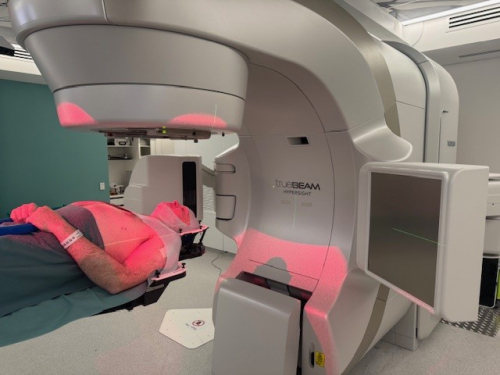Brachytherapy program helping men for two decades

A radiation therapy treatment that provides prostate cancer patients with an alternative to surgery is being acknowledged for 20 years of helping men at The Alfred.
“Over 1,570 men have received brachytherapy as part of their prostate cancer treatment since the program began,” said radiation oncologist Dr Bronwyn Matheson. “During this time our staff have been part of advances in technology and techniques leading to better outcomes for our patients.”
High dose-rate (HDR) brachytherapy involves using catheters or tubes to place a radioactive source directly into the area requiring treatment.
“It’s an alternative to surgery that can give equally good cure rates when combined with external beam radiation therapy,” said Dr Matheson, who’s been part of the program for 16 years.
Cranbourne resident Bill Lindsay is the hospital’s 500th HDR brachytherapy patient.
“When I got the results showing prostate cancer, I walked out feeling flat,” said the 60-year-old. “But while exploring what options I had, I spoke with Dr Matheson and she explained everything really clearly, so I felt more at peace.”
Professor Jeremy Millar, Director of Radiation Oncology at Alfred Health, has led the brachytherapy team for the past 20 years.
“It’s been great to see improvements in men’s cure rates and offer an alternative to surgery. Having your prostate removed has side effects and risks including the chance of incontinence and erectile dysfunction,” said Prof Millar.
Seed brachytherapy is also an option for some men, which involves radioactive ‘seeds’, smaller than a grain of rice, being placed inside the patient near the tumour.
The first patient received brachytherapy at The Alfred in December 1998 and since then, Professor Millar and his team have been involved in the evolution of technology and technique.
“We have improved the accuracy of treatment with image-guided brachytherapy. We can verify more precisely where the radiation is going to be given,” said Prof Millar.
“Radiation oncology treatments are the most complicated procedures at The Alfred and it requires a quality team and teamwork. There are so many different moving parts that you have to get right every time when treating a prostate cancer patient,” said Prof Millar.
Patient Bill Lindsay, who is currently a full-time carer for his mother, is looking forward to completing his treatment and plans on travelling more.
“I enjoy the Australian outback and I’d like to go back overseas too. I’m one of eight siblings and I have 56 cousins who I’m looking forward to spending more time with, and playing snooker.”


